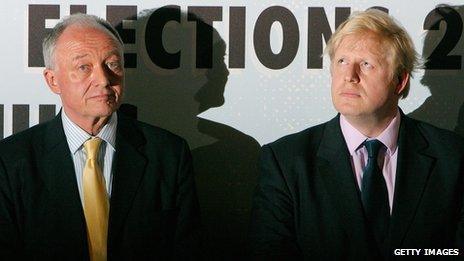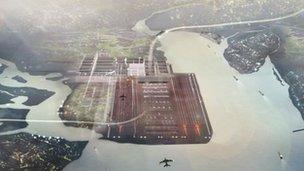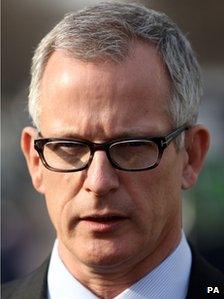Mayoral elections: Voters outside London 'disenfranchised'
- Published

Ken Livingstone and Boris Johnson both hope for a second chance to be Mayor of London
Voters in London will head to the polls on 3 May to decide who they want to be their mayor. But with Boris Johnson and Ken Livingstone seeking to exercise power outside of the capital, have voters in the home counties been left without an electoral voice?
The London Elections are anything but local.
Home to nearly eight million people and the seat of government, it is unsurprising London's power is felt beyond its boundaries.
The current mayor Boris Johnson and his Labour rival Ken Livingstone have signalled their intent to bring suburban rail services - some of which are in Kent, Essex and Hertfordshire - under the mayor's control.
Mr Johnson has also been at the forefront of efforts to build a new international hub airport in the south east of England.
However, his chosen location is not London, but the Thames Estuary, in Kent.
As a result, concerns have been raised that voters living in the home counties, who may also commute into the capital, are increasingly being left without a voice.
So has the fictional newspaper letter writer "Disgusted of Tunbridge Wells", now become "Disenfranchised of Tunbridge Wells"?
'Don't have a vote'
Rodney Chambers, who is the leader of the Conservative-run Medway Council, in north Kent, said there is great resistance to London "extending its tentacles" beyond its boundaries.
"Boris Johnson came up with this idea for the estuary airport off the top of his head, because he thought it was a vote winner," he said.
"He doesn't have any voters in Kent and we cannot show our disquiet because we don't have a vote in London."
The £40bn Thames Estuary airport idea has since moved beyond a Mr Johnson suggestion, to being looked at in detail by the government.
Mr Chambers believes the mayor's support for the plan was due to the electoral unpopularity among Londoners of a third runway at Heathrow airport.
And the leader of the Liberal Democrat group on the council, Geoff Juby, described the scheme as "pie in the sky".
"London has to address its own issues and look after its own people - not just pass the bits they don't want to deal with outside of the capital," he said.

The airport in the Thames Estuary would be built partly on reclaimed land
Mr Johnson has also, along with Mr Livingstone, advocated the bringing of some suburban rail services under Transport for London (TfL) and the mayor's control.
This follows the creation of London Overground in 2007, when TfL took over routes run by Silverlink.
Green Party candidate Jenny Jones also believes the network should come under TFL control and Liberal Democrat candidate Brian Paddick also backs the plans for "certain rail routes".
But opposition to the idea has been vocal.
In February, the deputy chairman of the Conservative Party and MP for Sevenoaks, Michael Fallon, said he was concerned his constituents could end up with a worse and more expensive service.
He said: "Why should [Boris Johnson] set fares and service levels when my constituents can't vote for him?"
However, the leader of the Labour group on Sevenoaks District Council, Mark Fittock, said there could be some advantages to the rail plan.
"Lots of people who live here work within London's boundaries and there would be some benefits to bringing the Oyster card system outwards," he said.
He added London does exert an influence outside of its boundaries, but it is more "economic and social, rather than political".
'Not subordinate to London'
A spokesman for Mr Johnson said the fractured organisation of London's suburban railways was "totally inefficient".
"It needs a complete overhaul and devolving the commercial franchises would allow him to invest millions of pounds in improving stations and to simplify the ticketing system, all aimed at improving the services," he said.

Lib Dem candidate Brian Paddick has criticised the estuary airport plan
And Mr Livingstone said bringing the suburban rail service under his control would be good for those living outside of the capital.
He said: "Millions of people come to work, visit or socialise in London.
"My plan to cut fares and to take over the suburban rail network and upgrade it to tube level performance will benefit Londoners, and those who live outside London."
Liberal Democrat candidate Brian Paddick has also expressed his approval for TfL taking over "certain rail routes".
He said: "What has Boris Johnson been doing for the past four years?
"If he had spent more talking and lobbying government to work out a proper plan rather than wasting time, effort and money on plans for a fantasy airport, then we might be a bit nearer actually seeing this happen."
Ms Jones said: "The Greens - both in and out of London - are opposed to the Thames Estuary airport, but of course recognise that this isn't something that is decided by City Hall."
She believes the mayor and assembly's remit to "fight London's corner in the setting of national policy", is a correct one.
"[But] I'd focus on issues that benefit Londoners - fighting air pollution, reducing fares, lobbying to restore funding for higher education and opposing NHS reform - not an airport that would increase air and noise pollution for Londoners," she said.
For politicians who represent constituents outside of the capital there are worries that so-called creeping powers could be the thin end of the wedge, with more influence heading London's way.
Medway Council leader, Mr Chambers, said the suggestion that someone in London should have some authority over the people of Kent has caused a lot of antagonism.
"At the end of the day we're not subordinate to London and we're here to do what is best for us and our surrounding areas," he said.
- Published13 February 2012
- Published20 January 2012
- Published7 March 2012
- Published3 March 2012
- Published18 January 2012
- Published14 December 2011
- Published2 August 2011
- Published7 December 2011
- Published29 November 2011